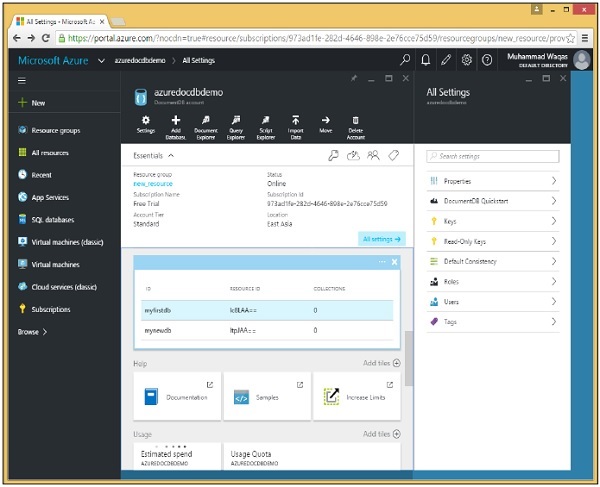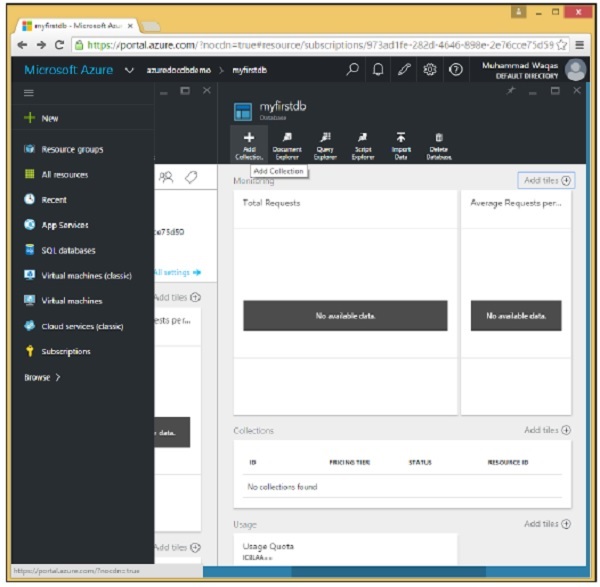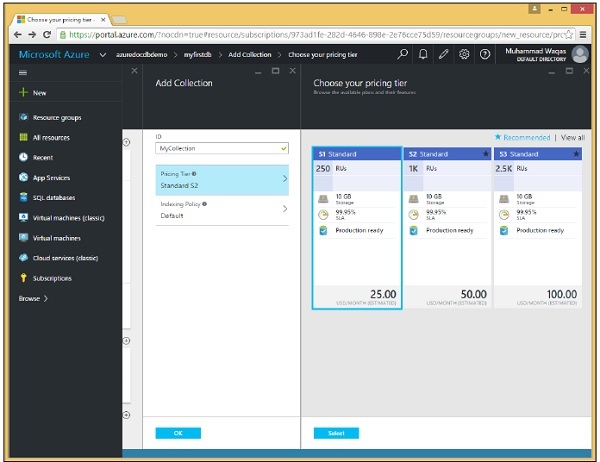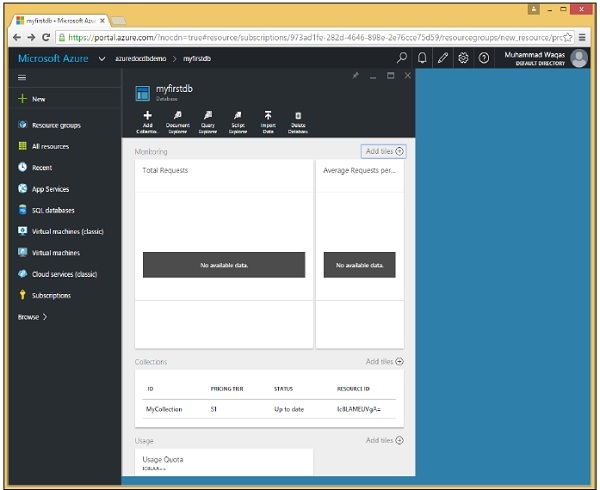📌 相关文章
- DocumentDB-删除集合(1)
- DocumentDB-删除集合
- DocumentDB-创建数据库
- DocumentDB-创建数据库(1)
- DocumentDB SQL-数组创建(1)
- DocumentDB SQL-数组创建
- DocumentDB-创建帐户(1)
- DocumentDB-创建帐户
- DocumentDB教程
- DocumentDB教程(1)
- DocumentDB-简介
- DocumentDB-简介(1)
- 讨论DocumentDB
- DocumentDB-数据类型(1)
- DocumentDB-数据类型
- DocumentDB-删除数据库(1)
- DocumentDB-删除数据库
- DocumentDB SQL-参数化(1)
- DocumentDB SQL-参数化
- DocumentDB-列表数据库(1)
- DocumentDB-列表数据库
- DocumentDB SQL-运算符(1)
- DocumentDB SQL-运算符
- DocumentDB SQL教程(1)
- DocumentDB SQL教程
- DocumentDB-分区
- DocumentDB-分区(1)
- DocumentDB-删除文档
- DocumentDB-删除文档(1)
📜 DocumentDB-创建集合
📅 最后修改于: 2020-11-28 13:44:58 🧑 作者: Mango
在本章中,我们将学习如何创建集合。它类似于创建数据库。您可以从门户网站或使用.Net SDK的代码创建集合。
步骤1-转到Azure门户上的主仪表板。

步骤2-从数据库列表中选择myfirstdb。

步骤3-单击“添加集合”选项并指定集合的ID。选择不同的定价层选项。

步骤4-让我们选择S1 Standard,然后单击选择→确定按钮。

如您所见,MyCollection已添加到myfirstdb中。
您还可以使用.Net SDK从代码创建集合。让我们看一下从代码添加集合的以下步骤。
步骤1-在Visual Studio中打开控制台应用程序。
步骤2-要创建集合,请首先在CreateDocumentClient任务中通过其ID检索myfirstdb数据库。
private static async Task CreateDocumentClient() {
// Create a new instance of the DocumentClient
using (var client = new DocumentClient(new Uri(EndpointUrl), AuthorizationKey)) {
database = client.CreateDatabaseQuery("SELECT * FROM c WHERE c.id =
'myfirstdb'").AsEnumerable().First();
await CreateCollection(client, "MyCollection1");
await CreateCollection(client, "MyCollection2", "S2");
}
}
以下是CreateCollection任务的实现。
private async static Task CreateCollection(DocumentClient client, string collectionId,
string offerType = "S1") {
Console.WriteLine();
Console.WriteLine("**** Create Collection {0} in {1} ****", collectionId, database.Id);
var collectionDefinition = new DocumentCollection { Id = collectionId };
var options = new RequestOptions { OfferType = offerType };
var result = await client.CreateDocumentCollectionAsync(database.SelfLink,
collectionDefinition, options);
var collection = result.Resource;
Console.WriteLine("Created new collection");
ViewCollection(collection);
}
我们创建一个新的DocumentCollection对象,该对象使用CreateDocumentCollectionAsync方法的所需ID定义新集合,该方法还接受一个options参数,我们在此处使用该参数来设置新集合的性能层,我们将其称为offerType。
这默认为S1,由于我们没有为MyCollection1传递offerType,因此它将是S1集合,对于MyCollection2,我们已传递S2,这使它成为S2,如上所示。
以下是ViewCollection方法的实现。
private static void ViewCollection(DocumentCollection collection) {
Console.WriteLine("Collection ID: {0} ", collection.Id);
Console.WriteLine("Resource ID: {0} ", collection.ResourceId);
Console.WriteLine("Self Link: {0} ", collection.SelfLink);
Console.WriteLine("Documents Link: {0} ", collection.DocumentsLink);
Console.WriteLine("UDFs Link: {0} ", collection.UserDefinedFunctionsLink);
Console.WriteLine(" StoredProcs Link: {0} ", collection.StoredProceduresLink);
Console.WriteLine("Triggers Link: {0} ", collection.TriggersLink);
Console.WriteLine("Timestamp: {0} ", collection.Timestamp);
}
以下是集合的program.cs文件的完整实现。
using System;
using System.Collections.Generic;
using System.Linq;
using System.Text;
using System.Threading.Tasks;
using Microsoft.Azure.Documents;
using Microsoft.Azure.Documents.Client;
using Microsoft.Azure.Documents.Linq;
using Newtonsoft.Json;
namespace DocumentDBDemo {
class Program {
private const string EndpointUrl = "https://azuredocdbdemo.documents.azure.com:443/";
private const string AuthorizationKey = "BBhjI0gxdVPdDbS4diTjdloJq7Fp4L5RO/
StTt6UtEufDM78qM2CtBZWbyVwFPSJIm8AcfDu2O+AfV T+TYUnBQ==";
private static Database database;
static void Main(string[] args) {
try {
CreateDocumentClient().Wait();
} catch (Exception e) {
Exception baseException = e.GetBaseException();
Console.WriteLine("Error: {0}, Message: {1}", e.Message, baseException.Message);
}
Console.ReadKey();
}
private static async Task CreateDocumentClient() {
// Create a new instance of the DocumentClient
using (var client = new DocumentClient(new Uri(EndpointUrl), AuthorizationKey)) {
database = client.CreateDatabaseQuery("SELECT * FROM c WHERE c.id =
'myfirstdb'").AsEnumerable().First();
await CreateCollection(client, "MyCollection1");
await CreateCollection(client, "MyCollection2", "S2");
//await CreateDatabase(client);
//GetDatabases(client);
//await DeleteDatabase(client);
//GetDatabases(client);
}
}
private async static Task CreateCollection(DocumentClient client,
string collectionId, string offerType = "S1") {
Console.WriteLine();
Console.WriteLine("**** Create Collection {0} in {1} ****", collectionId,
database.Id);
var collectionDefinition = new DocumentCollection { Id = collectionId };
var options = new RequestOptions { OfferType = offerType };
var result = await
client.CreateDocumentCollectionAsync(database.SelfLink,
collectionDefinition, options);
var collection = result.Resource;
Console.WriteLine("Created new collection");
ViewCollection(collection);
}
private static void ViewCollection(DocumentCollection collection) {
Console.WriteLine("Collection ID: {0} ", collection.Id);
Console.WriteLine("Resource ID: {0} ", collection.ResourceId);
Console.WriteLine("Self Link: {0} ", collection.SelfLink);
Console.WriteLine("Documents Link: {0} ", collection.DocumentsLink);
Console.WriteLine("UDFs Link: {0} ", collection.UserDefinedFunctionsLink);
Console.WriteLine("StoredProcs Link: {0} ", collection.StoredProceduresLink);
Console.WriteLine("Triggers Link: {0} ", collection.TriggersLink);
Console.WriteLine("Timestamp: {0} ", collection.Timestamp);
}
}
}
编译并执行上述代码后,您将收到以下输出,其中包含与收集有关的所有信息。
**** Create Collection MyCollection1 in myfirstdb ****
Created new collection
Collection ID: MyCollection1
Resource ID: Ic8LAPPvnAA=
Self Link: dbs/Ic8LAA==/colls/Ic8LAPPvnAA=/
Documents Link: dbs/Ic8LAA==/colls/Ic8LAPPvnAA=/docs/
UDFs Link: dbs/Ic8LAA==/colls/Ic8LAPPvnAA=/udfs/
StoredProcs Link: dbs/Ic8LAA==/colls/Ic8LAPPvnAA=/sprocs/
Triggers Link: dbs/Ic8LAA==/colls/Ic8LAPPvnAA=/triggers/
Timestamp: 12/10/2015 4:55:36 PM
**** Create Collection MyCollection2 in myfirstdb ****
Created new collection
Collection ID: MyCollection2
Resource ID: Ic8LAKGHDwE=
Self Link: dbs/Ic8LAA==/colls/Ic8LAKGHDwE=/
Documents Link: dbs/Ic8LAA==/colls/Ic8LAKGHDwE=/docs/
UDFs Link: dbs/Ic8LAA==/colls/Ic8LAKGHDwE=/udfs/
StoredProcs Link: dbs/Ic8LAA==/colls/Ic8LAKGHDwE=/sprocs/
Triggers Link: dbs/Ic8LAA==/colls/Ic8LAKGHDwE=/triggers/
Timestamp: 12/10/2015 4:55:38 PM